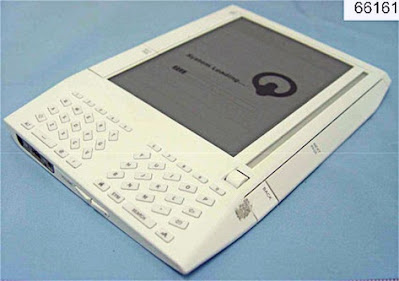So every time some new 'ebook' device is announced, we're 'sposed to drop everything and proclaim it a paradigm shift? At least that's the routine.
This week's candidate is the Amazon Kindle -- at least as presented in an article in Newsweek extolling its virtues titled "The Future of Reading" by Steven Levy.
The article is nothing but an uncritical paean to Amazon. The thinking behind it literally is: because Amazon has released the device, ipso facto we're entering "an exciting -- and jarring -- post-Gutenberg era". "The e-book reader," he declares, "is coming of age".
On the other hand, there's no serious analysis of why similar devices have failed in the past or why alternatives such as smartphones and laptops continue to prove more successful.
Instead what we get is a mis-mash of every technical buzzword and concept in the book. Words like "milestone" and "revolution" are mentioned. There's the obligatory iPod analogy. The device is possessed of a "disruptive" nature (well, what isn't these days?) and there's even talk of "Book 2.0".
From there, the author gets totally lost in a discussion of paper vs. electronic and the joys of hypertext (the "always-on book") that could have been written by Vannevar Bush.
All you have to know about the author is that he plunked down $1.99 for an electronic copy of Dickens' "Bleak House" -- a work long out of copyright and available for free at close to a million other sites -- he bought that and thinks he got a bargain ("You can also get classics for a song.")
This is gonzo tech journalism at its worst -- repeated for a day only to be replaced by the next new (under-preforming) device that some media giant wants to shove down our throats.
Update: Here's another example of uncritical stenography -- this time from CNET ...

4 comments:
I thought I left a comment on this post before, but it's not here. Hmmm. I think I said something to effect of "what ten years from now and you'll laugh at this post, as e-ink will revolutionize the publishing industry."
First, on your original comment, maybe you hit 'preview'?
Anyway thanks for the note of confidence.
I'm personally waiting for twelve months from now when we can talk about how all these tech glamor journalists got it so wrong.
In fact, you'll be able to tell by the first sign of the press release which goes:
"Though widely criticized at its initial launch, Amazon has striven in the past 12 months to meet consumer complaints by launching version 2.0 of Kindle."
"CEO Jeff Bezos added, 'We were a little off with the first version but this second version will change the very way we understand reading. For real this time!"
Wash. Rinse. Repeat.
Mr. Klein,
You say, "All you have to know about the author is that he plunked down $1.99 for an electronic copy of Dickens' "Bleak House" [sic] -- a work long out of copyright and available for free at close to a million other sites -- and thinks he got a bargain."
I am not a Kindle owner, but I have used a Palm for e-book use occasionally. Have you? Do you know how tedious and unsatisfying it is to use a Palm for this purpose? Yes, this fellow could have gotten _Bleak House_ free. Then, to use it on a Kindle, he'd have to have it reformatted for the device, which, though it can be done for free, takes time and will not necessarily be perfect. Finding a free version that isn't in some annoying layout (e.g. html) also takes time.
There is also, I'd add, a tremendous benefit in NOT having vast personal libraries of heavy books. I used to think it was cool, until my own became a burden.
If Amazon had managed to get more of the books I wanted made available, I'd probably have already gone Kindle. The fact is, though, that many books ARE available.
Still, I'm glad that you are bucking the trend. Disagreements are nearly always very valuable.
Hi Sam,
First thanks for the comment.
I guess my biggest problem with the Kindle and other 'eBook' devices is the almost complete disregard of reality when evaluating them. Typically in an article, people critique them compared to traditional books (really silly) or other 'ebook' devices.
Nowhere in the discussion, is any indication that there are devices ranging from your Palm to ultra-mini laptops that are not only more capable but way more popular.
It's only if you completely ignore this competition, that 2nd rate devices like the Kindle suddenly look promising.
It's nothing but promo, pure and simple.
Post a Comment